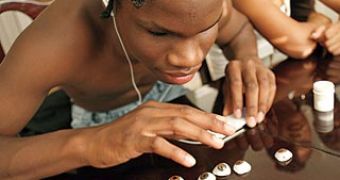We know that echolocation is extensively used by bats, dolphins and by some bird species. Based on the echo made by the sounds or ultrasounds they emit, these species can make an auditive image of their environment. It is literally like seeing with your ears.
We, as humans, can't really imagine this. But when the body loses one sense, this can boost the remaining senses to the limits that are quite unusual for the ordinary people. This is the case of Ben Underwood, 14, a Sacramento blind boy. "I tell people I'm not blind. I just can't see.", Ben says.
This amazing boy goes around the way bats and dolphins do: by echolocation. Echolocation allows him to play on his skateboard outside or kickball with his friends, just like any other kid would do it.
Ben is completely blind since the age of 3, when retinal cancer was detected in both his eyes (he now wears two prostheses).
He has learned to detect and locate objects by emitting a steady stream of sounds with his tongue, then picking up for the echoes as they bounce back. His clicks are as loud as the snapping of fingers. The echoes they provoke can be soft (in the case of metals), dense (wood) or sharp (glass). The echoes' loudness allows him to asses distances.
Many blind people detect echoes to some degree, but Ben's skill to navigate using them is amazing. "His skills are rare. Ben pushes the limits of human perception," said Dan Kish, a blind psychologist and leading teacher of echomobility among the blind.
There are many circulating stories about Ben. Once, a fifth grader punched Ben and ran. That's when Ben started his clicks. "I chased him, clicking until I got to him, then I socked him a good one. He didn't reckon on me going after him. But I can hear walls, parked cars, you name it. I'm a master at this game." said Ben.
Kish has taught echolocation to many blind people, but using echolocation to get around was achieved by only a handful of people in the world.
Ben can play basketball, ride horses and dance with girls at school events; he is good at PlayStation games, as he can memorize the sounds that characters and movements emit. "The hardest thing for me to accept is rejection. I can tell when someone rejects me in some way." said Ben.
Ben learned the Braille alphabet and to walk with a cane, but at the age of 3 he started teaching himself echolocation, by tossing objects and emitting clicking sounds to find them. His echolocation skill is greatly due to his exceptional hearing. "One time a CD fell off his desk and I was reaching for it when he said, 'Nah, I got it,'. He went right to it. Didn't feel around. He just knew where it was because he heard where it hit." said Kalli Carvalho, his language arts instructor.
At the age of 6, Ben decided he won't use a cane. "You go to school and you're the only one with a stick, what's the first thing some kid's going to do? Break it in two. And then where are you? You're helpless." he said.
Sometimes, echolocation enables him to orientate where normal people cannot do it. "I remember taking him to the park with my son, sister and my nieces, and it got dark. But Ben had figured out the park's layout, and he led the way out. He was in his element." said one of his teachers.
Some specialists are concerned that his near-complete reliance on echolocation could incapacitate Ben in unfamiliar settings. "The thing I'm most scared of is water. But if I had eyes, it's what I'd most like to see." said Ben.
On June 25 he traveled to San Diego's SeaWorld Adventure Park to swim with dolphins and listen to their echolocation. "Man, she clicks fast!" said Ben about Sandy, a bottle-nosed dolphin. Ben played 45 minutes with Sandy. "He's got a gift with dolphins; he's truly unique. I told him, once he's 18 he's got a job here anytime.", said Bob McMains, supervisor of SeaWorld's dolphin program. Now, Ben wants to become a Maths teacher or a pro skateboarder.

 14 DAY TRIAL //
14 DAY TRIAL //